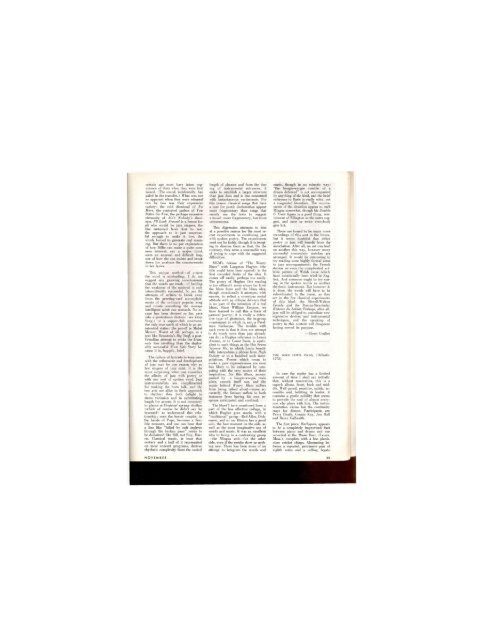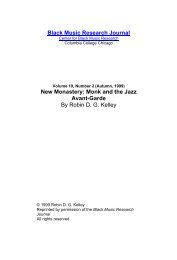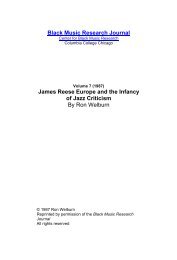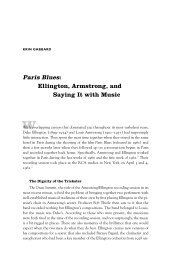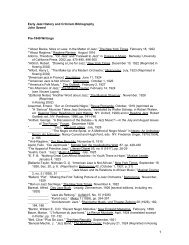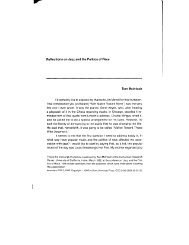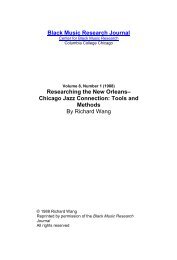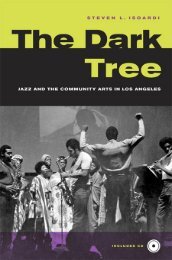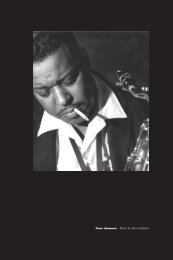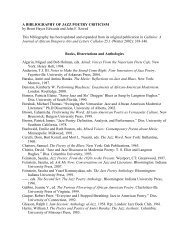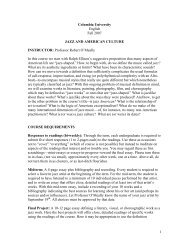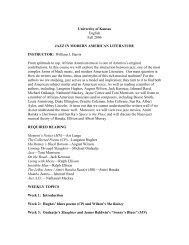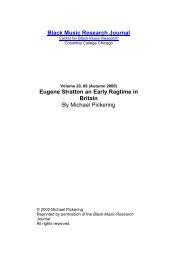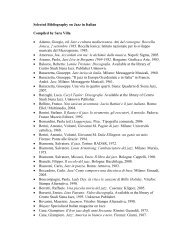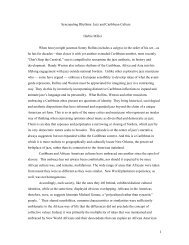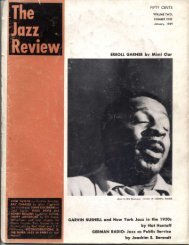The Jazz Review - Jazz Studies Online
The Jazz Review - Jazz Studies Online
The Jazz Review - Jazz Studies Online
You also want an ePaper? Increase the reach of your titles
YUMPU automatically turns print PDFs into web optimized ePapers that Google loves.
certain age must have taken cognizance<br />
of them when ihc\ were fn,t<br />
issued. (<strong>The</strong> sound, incidentally, has<br />
paled in the transfer.) What was not<br />
so apparent when they were released<br />
two by two was their expressive<br />
variety: the cold dismissal of No<br />
More, the contorted pathos of You<br />
Better Co Now the oerhans excessive<br />
virtuosity of Ain't Nobody's Bust,<br />
I'll Look Around is a lesson for<br />
all who would be jazz, singers, the<br />
line sustained from first to last,<br />
the annroarh to it hist susnense<br />
ful enough to make it live the<br />
wnrds fnrrpd tn urnpratp rpal mean<br />
mfrBul"therew^eSpIanE<br />
n 1 how R ie ran make ,m, teTom<br />
m in7„v»l sat I I<br />
Zem an uniuaf an^ difficult kip!<br />
in her lyrics counterwords<br />
This unique method—of course<br />
the word is misleading; I do not<br />
suggest any gnawing consciousness<br />
that the words are trash—of battling<br />
the weakness of the material is only<br />
intermittently successful. So are the<br />
attempts of writers to break away<br />
from the greeting-card accomplishments<br />
of the ordinary popular song<br />
and create something the average<br />
intelligent adult stomach: No escape<br />
has heen devised so icir Stive<br />
into a oretentious rhetoric (see' Deeo<br />
Sons I or a sunner-rhib smartness<br />
the onlv true merit of which is an un¬<br />
Intended status he navoff il Mabel<br />
Mercer Worst 'of all nerhaos is a<br />
te*H ke RernsJn's ftV Stnff a nost<br />
F.df»« .t^nTtn «oV*£A?,«<br />
Ink llss in drinl tZT thderZ'<br />
c^se k is happilyrbrie?<br />
<strong>The</strong> failure of lvricists to keep pace<br />
with the refinement and development<br />
of jazz may be one reason why so<br />
few singers of jazz exist, ft is the<br />
more surprising when one considers<br />
the affinity of jazz with poetry or<br />
with any sort of spoken word 'jazz<br />
instrumentalists are complimented<br />
for making the horn talk, and the<br />
two arts are alike in their approach<br />
to rhvthm- thev both delidit in<br />
stress variation and in substituting<br />
lensth for accent It is not neressarv<br />
to dance at Hookins' sorum? rhvthm<br />
(which of course he didn't sav he<br />
invpiitrHl tn nnHprstand this r*l«i<br />
tionshio even the heroic couolet in<br />
hehand", of Pone h^omes a flex<br />
hie measure Tnd one rarT hear thai<br />
tbrnnffh rfw hrnlTn L T n S<br />
he Claimed hkp Rill nnt Rnv Har<br />
ris Haldeal 1,X at last VW<br />
"'• „ a'jI a Wf nf it<br />
Tr, »rf I . 't represented<br />
rhythmic complexity^ f om the d<br />
length of phrases and from the timing<br />
of instrumental entrances; it<br />
seeks to establish a larger structure<br />
than jazz does and is less concerned<br />
with instantaneous excitements. For<br />
this reason classical songs that have<br />
a care for poetic declamation appear<br />
more fragmentary than songs that<br />
merely use the texts to suggest<br />
a mood: more fragmentary, but more<br />
venturesome.<br />
This digression attempts to hint<br />
at a possible reason for the most recent<br />
experiments in combining jazz<br />
with spoken poetry. <strong>The</strong> experiments<br />
need not be faddy, though it is tempting<br />
to dismiss them as that. On the<br />
contrary they seem a seasonable way<br />
of trying to cope with the suggested<br />
difficulties.<br />
MGM's release of "<strong>The</strong> Weary<br />
Blues" with Langston Hughes (the<br />
title could have been spared) is the<br />
first recorded fruits of the idea. It<br />
comes off easily, perhaps too easily.<br />
<strong>The</strong> poetry of Hughes I his reading<br />
is too offhand) never strays far from<br />
the blues form and the blues idea,<br />
though occasionally it attempts with<br />
success, to reflect a conscious social<br />
attitude with an oblique delicacy that<br />
is no part of the intention of a real<br />
blues. Since William Fmpson, we<br />
have learned to call this a form of<br />
nastoral noetrv • it is reallv a defen<br />
sive tvoe of diettoism the in zrouo<br />
counteroart to which is sav aPerel<br />
man buXsoue <strong>The</strong> trouble with<br />
sorh verse fs that it does not attemnt<br />
r« d« ,eb haniZ ,3<br />
lan dna H, lk« ^rS^WlZZ<br />
Av.n,?; J r P i n t RST i~ —<br />
Avenue, or to.Count Basie, is. equiv<br />
sT» , tV •„ 51 t i l ? \1ZJ<br />
Squeeze Me in which Louis beautifully<br />
interpolates a phrase from High<br />
Soctety or to a hundred such interpolations.<br />
Poems which mean to<br />
evoke a jazz expressiveness are even<br />
less likely to be enhanced by competing<br />
with the very source of their<br />
inspiration. Six Bits Blues, accompanied<br />
by a boogie-woogie tram<br />
piece, cancels itself out, and the<br />
music behind Weary Blues suffers<br />
from being talked about—more accurately,<br />
the listener suffers in both<br />
instances from having his own re¬<br />
sponse anticipated and confined.<br />
<strong>The</strong> blues" I have mentioned form a<br />
part of the less effective collage, in<br />
which Hughes goes snacks with a<br />
"traditional" group—Red Allen, Dickenson*<br />
and so on* Hinton has a good<br />
solo, the best moment on the side, as<br />
well as the most imaginative use of<br />
words and music. It was an excellent<br />
idea to brine in a contrasting erouD<br />
-the Mingus unit—for the other<br />
side, if the results show us nothing<br />
new <strong>The</strong>re has been more of an<br />
attempt to integrate the words and<br />
music, though in no mimetic way:<br />
"the boogie-woogie rumble of a<br />
dream deferred" is not accompanied<br />
by anything of the kind, and the brief<br />
reference to Basie is really witty, not<br />
a misguided literalism. <strong>The</strong> requirements<br />
of the situation appear to curb<br />
Mingus somewhat, though his Double<br />
G Train figure is a good thing, reminiscent<br />
of Ellington as the notes sugeest<br />
and once or twice everybody<br />
lets'hot.<br />
<strong>The</strong>re are hound to be many more<br />
recordings of this sort in the future,<br />
but it seems doubtful that either<br />
poetry or jazz will benefit from the<br />
association. After all, no art can feed<br />
on another this way however many<br />
successful momentary matches are<br />
arranged. It would be interesting to<br />
try reading some highly formal verse<br />
to iazz accompaniment- the French<br />
stanzas or even the complicated syllabic<br />
patters of Welsh verse which<br />
have occasionally been tried in English<br />
And someone oudit to trv cueinYin<br />
the spoken words as another<br />
rhythmic instrument. But however it<br />
is done the words will have to he<br />
subordinated to the music as thev<br />
are in the few elas!iral ex^r.ments<br />
of this kind • T « r 3 8 T t o !<br />
Facade »n t h / L m S n v i n b<br />
UiZL d, Snl L IVr 11 11it i' i' -ill<br />
ZllZ]] hp E t f - S h ^ n <br />
having served its purpose<br />
P P<br />
—Glenn Coulter<br />
T H E J O H N LEWIS PIANO, (Atlantic<br />
1272)<br />
In case the reader has a limited<br />
amount of time I shall sav initially<br />
that, without reservation, 'this is a<br />
superb album, front, back and middle.<br />
Well paced, sensitive, subtle, accessible<br />
and befitting its leader it<br />
contains a gentle nobility that seems<br />
to pervade the soul of almost every¬<br />
one who plays with him. <strong>The</strong> instrumentation<br />
varies but the continuity<br />
stavs for dinner Partieinants are<br />
Percv Heath Connie Kav lira Hall<br />
and Barry Galbraith.<br />
<strong>The</strong> first piece, Harlequin, appears<br />
to be a completely improvised duet<br />
between piano and drums and was<br />
recorded at the Music Barn (Lenox,<br />
Mass.), complete with a few pianissimo<br />
cricket chirps. Alternating between<br />
a repeated, percussive pair of<br />
eighth notes and a rolling, legato


